
Servant of God Fr. John A. Hardon, S.J., the founder of the Institute on Religious Life, summarized it this way:
“A religious vocation is a special grace that God gives to certain persons, calling them to a life of the evangelical counsels.”

Servant of God Fr. John A. Hardon, S.J., the founder of the Institute on Religious Life, summarized it this way:
“A religious vocation is a special grace that God gives to certain persons, calling them to a life of the evangelical counsels.”
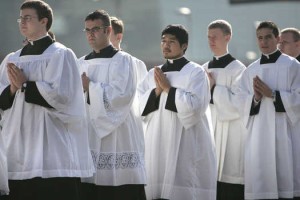 I spent a couple wonderful years with a religious community in the 1980s as I was discerning a possible vocation to the priesthood and religious life. One day, they brought in a well-known retreat master to give the two dozen or so seminarians a day of recollection.
I spent a couple wonderful years with a religious community in the 1980s as I was discerning a possible vocation to the priesthood and religious life. One day, they brought in a well-known retreat master to give the two dozen or so seminarians a day of recollection.
The first words of the priest to begin the day of recollection really startled me. He bluntly said, “None of you are called to the priesthood.” I looked around the room at all the postulants and said to myself, “Boy, Father Tom (the community’s vocation director) sures knows how to pick ‘em!”
The priest then explained that our vocation is “now,” that we must respond wholeheartedly to the Lord right here, right now by being holy seminarians. In five or six years, God willing, the bishop will lay hands on some of us, and then–and only then–would we truly be called to the priesthood.
As it turned out, I wasn’t one of the men called to become a priest. Yet, this important lesson has always stayed with me as a lay Catholic.
Continue reading Right Here, Right Now
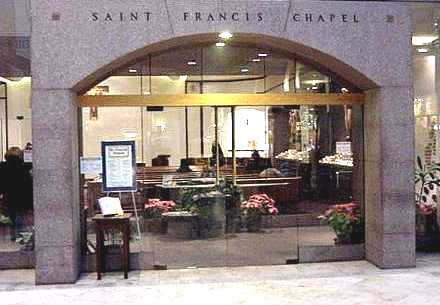 The Catholic Sentinel recently published an uplifting piece entitled, “Friar who evangelizes in the mall: ‘‘We are an absolutely passive church,’” on Dominican friar Fr. Tony Wall. Rather than passively wait for people to come to him, he sets up shop in a mall in the Portland area where he engages shoppers every day.
The Catholic Sentinel recently published an uplifting piece entitled, “Friar who evangelizes in the mall: ‘‘We are an absolutely passive church,’” on Dominican friar Fr. Tony Wall. Rather than passively wait for people to come to him, he sets up shop in a mall in the Portland area where he engages shoppers every day.
“People are hungry to have the Church stand up and say, ‘Come, come, come,'” Father Wall says. “I think every big mall in the country should have a Catholic presence. All I think the Church needs to do is rent a chair and have a priest sit there and have a sign that says, ‘Have a question? Ask a priest.'”
I’m not sure how many malls in the country have something like this, but one that springs to mind is St. Francis Chapel at the Prudential Center in Boston, run by the Oblates of the Virgin Mary, an IRL affiliate, for over a quarter of a century.
Last time I was there, I think there was an Au Bon Pain on one side and a Dunkin Donuts on the other. But once shoppers and businesspersons step inside, they are in God’s house. The chapel has Masses, devotions, and Confessions going on all day, meeting busy people where they are. What an impressive manifestation of the “new evangelization.”
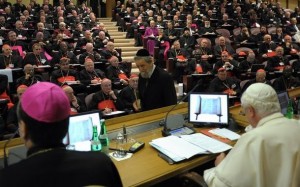 The Pontifical Councils for Culture and Social Communications are organizing a gather of Catholic bloggers in Rome on Monday, May 2, 2011, the day after Pope John Paul II’s beatification.
The Pontifical Councils for Culture and Social Communications are organizing a gather of Catholic bloggers in Rome on Monday, May 2, 2011, the day after Pope John Paul II’s beatification.
The aim of the meeting is to allow for a dialogue between bloggers and Church representatives, to listen to the experiences of those who are actively involved in this arena, and to achieve a greater understanding of the needs of the blogging community. The meeting will also allow for a presentation of some Church initiatives to engage the new media technologies, both in Rome and at the local level.
The first panel of presenters will consist of five bloggers, representing five different language groups. Simultaneous translation will be provided in Italian, English, French, Polish and Spanish.
The second panel will draw on people involved in the Church’s communications outreach, such as Fr. Lombardi from the Vatican press office, who will speak of their experiences in working with new media and initiatives aimed at ensuring an effective engagement by the Church with bloggers.
The meeting is taking place on the day after the beatification of Pope John Paul II in order to take advantage of the presence in Rome of many bloggers. Those who wish to attend need to apply by email and send a link to their blog. As space is limited to 150 seats, those who are interested should apply now.
This upcoming conference serves to reinforce the importance of this year’s National Meeting of the Institute on Religious Life, which is devoted to the subject of utilizing the new media–including blogging!–for the new evangelization. The National Meeting will be held on April 29-May 1, 2011 at the University of St. Mary of the Lake in Mundelein, Illinois. For more information and/or to register for the event, click here.
Courtesy of Vatican Radio.
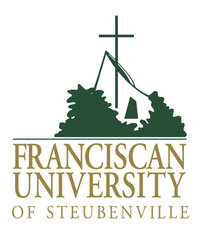 Terry Mattingly, author of the syndicated “On Religion” column for the Scripps Howard News Service, posted an interesting piece last week entitled, “Future nuns, priests face big questions.”
Terry Mattingly, author of the syndicated “On Religion” column for the Scripps Howard News Service, posted an interesting piece last week entitled, “Future nuns, priests face big questions.”
By “big questions,” Mattingly is really talking about the perennial questions surrounding the discernment of one’s vocation, but with the added complications of today’s landscape, including the dramatic decline (and graying) of religious vocations in America in recent decades.
The primary focus of the piece, however, concerns the response to these “big questions” by students at Franciscan University of Steubenville, where vocations have been flourishing. For example, Mattingly points out that the Priestly Formation Program on campus has produced 400 priests (with many more still in formation) over the past 25 years.
He also mentions that “many of America’s 244 Catholic colleges and universities offer similar programs.” Of course, if there were 244 Steubenvilles, we wouldn’t be wondering about tomorrow’s vocations (except maybe about where to put them all!). As it is, very few colleges have fostered vocations the way Franciscan University has.
Mattingly gives several reasons why Franciscan University enjoys such success. Clearly the vibrancy, or what the school at times calls its “dynamic orthodoxy,” is very attractive.
Yet, I think Fr. Richard Davis, T.O.R., whom Mattingly quotes in the article, does well to stress the fact that there are three male and four female religious orders that maintain houses near the campus. Fr. Davis also pointed out that many other orders regularly send younger members to visit the campus or study there.
“Our students are very sensitive to this,” said Davis. “New styles of habits and robes keep appearing here all the time. The students see that and it makes them curious. . . . This campus produces a large number of priests, but I believe even more of our young women become sisters and nuns.”
Click here for more information on this summer’s youth conferences sponsored by Franciscan University of Steubenville.
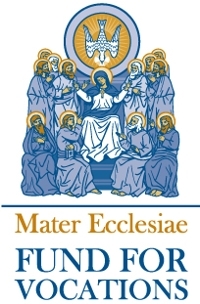 A few days ago I received in the mail the newsletter of the Mater Ecclesiae Fund for Vocations (MEFV). I remember when Corey and Katherine Huber were going public with the MEFV about five years ago. It seemed like a very good idea then; it seems like a great idea now.
A few days ago I received in the mail the newsletter of the Mater Ecclesiae Fund for Vocations (MEFV). I remember when Corey and Katherine Huber were going public with the MEFV about five years ago. It seemed like a very good idea then; it seems like a great idea now.
What the MEFV does is help those pursuing priestly or religious vocations by eliminating financial obstacles. Many prospective seminarians or religious aspirants have outstanding student loans that must be paid before they can enter the religious institute. The MEFV takes over the regular student loan payments of its grant recipients once they begin their formation.
For more on how the MEFV grant program works, click here.
What really grabbed my attention, though, was the news that the MEFV awarded 18 new vocation-enabling grants in 2011! The total amount of the grants was $450,000.
It should be noted, too, that the MEFV has a carefully constructed list of approved seminaries as well as criteria for approving religious institutes. We’re proud that affiliation with the Institute on Religious Life is one of the criteria the MEFV uses in determining whether a given institute is faithful to the Magisterium.
Two other features of the MEFV site I really like are of course the numerous vocation stories and the Grant Recipient Milestones page, which provides continual updates regarding entrance into novitiate, first vows, final profession, ordination, and other such important moments in the life of a priest or religious. Those pages mean a lot to those of us who contribute to the MEFV, and they remind us of the great spiritual benefit of all the prayers and Masses that are offered for MEFV benefactors.
That of course brings me to the “Donate to the MEFV” page. For those of you who would like to financially support vocations, I highly recommend the MEFV as a “holy mutual fund” that supports an impressive “portfolio” of seminarians and religious, and which already is clearly paying spiritual “dividends.”
 The online store at the Institute on Religious Life has a wonderful selection of vocation-related resources.
The online store at the Institute on Religious Life has a wonderful selection of vocation-related resources.
One such resource is An Undivided Heart: Pope John Paul II on the Deeper Realities of the Consecrated Life, by Sr. Evelyn A. Schumacher, O.S.F. An Undivided Heart illuminates Pope John Paul II’s teaching on the mystery of the consecrated life by weaving together his many exhortations, treating all the essential elements in a way that not only instructs the mind, but also inspires the heart and elevates the soul.
This 94-page book serves well as an introduction to the consecrated life for novices and those in discernment, but could also benefit religious who are seeking personal renewal. An Undivided Heart has questions for study and reflection for each of the eight chapters and a bibliography.
Cardinal Francis George of Chicago calls it, “A much-needed book in this moment of the Church’s life.”
This is just one of several such gems available through the Institute on Religious Life. Check out our online catalog today!
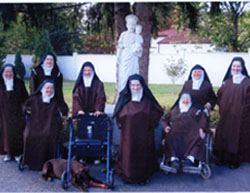 Today I visited the website of the Carmelite Nuns of the Ancient Observance, Monastery of St. Therese, in Coopersburg, PA, near Allentown. This Carmelite community is an affiliate of the Institute on Religious Life, but I hadn’t read much about them. What a beautiful cloistered community! Click here for their horarium, or daily schedule.
Today I visited the website of the Carmelite Nuns of the Ancient Observance, Monastery of St. Therese, in Coopersburg, PA, near Allentown. This Carmelite community is an affiliate of the Institute on Religious Life, but I hadn’t read much about them. What a beautiful cloistered community! Click here for their horarium, or daily schedule.
What really struck me, however, was the online biography of the community’s foundress, Mother Therese of Jesus, O. Carm. (1877-1939).
The occasion for writing the biography came when, during an expansion of the monastery’s mausoleum, Mother Therese’s remains were exhumed and were found to be incorrupt, despite the passage of 63 years!
The Coopersburg Carmelites follow strict papal enclosure. The essence of their daily life is living in the presence of God, in imitation of the Blessed Virgin Mary and the prophet Elijah. They pray especially for priests, religious, and for all missionaries, and they pray and do penance for the whole world.
The Coopersburg Carmelites maintain their own orchards, bake altar breads, and do other labors in cloister to maintain their monastery.
 For Archbishop Onesimo C. Gordoncillo, the Church’s outreach to young people and families is a top priority. He has been the shepherd of the Archdiocese of Capiz on the island of Panay for 25 years now.
For Archbishop Onesimo C. Gordoncillo, the Church’s outreach to young people and families is a top priority. He has been the shepherd of the Archdiocese of Capiz on the island of Panay for 25 years now.
This island lies in the Western Visayas Sea and belongs to the Philippines. The seat of the archdiocese and capital of the province of Capiz is Roxas City, with around 150,000 inhabitants. It is known as the “seafood capital of the Philippines.” The locals live either from fishing or from agriculture. Continue reading It’s Not About Us
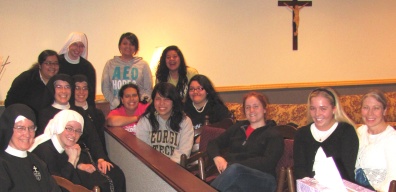 Check out Terry Mattingly’s post from last Thursday entitled “Fewer children? Then fewer nuns . . .” This post is a commentary on an earlier Religion News Service article on that topic, based on the CARA Report on the newly professed religious issued a couple months ago. He asserts that the shrinking of American families has contributed to parents’ unwillingness to have their children enter religious life.
Check out Terry Mattingly’s post from last Thursday entitled “Fewer children? Then fewer nuns . . .” This post is a commentary on an earlier Religion News Service article on that topic, based on the CARA Report on the newly professed religious issued a couple months ago. He asserts that the shrinking of American families has contributed to parents’ unwillingness to have their children enter religious life.
Mattlingly points out that while there is a “season of demographic decline” among women’s religious communities, there are some religious communities are booming. He makes the connection that there must be a doctrinal component in all this and says that’s the Vatican’s take on it, too.
From my own experience as the father of a young religious sister, I can surely affirm it’s a doctrinal matter—both for those entering religious life as well as for the parents, whose faith and lifestyle have a huge influence on their children.
As I noted in my comment at the end of the post, what really struck me was the closing comment about promoting vocations in a “culture nervous about large families.” Large families have alway been considered a sign of hope and divine blessing. Ours is largely a “culture of death” lacking in supernatural hope. And so we’re nervous.
More simply put, if the family is without a living faith and doesn’t esteem religious life (or priesthood or even having more kids), then it’s not fertile soil for vocations. That’s why we need a “new evangelization.”